The Benefits of Incorporating Serums into Your Skincare Routine

Frequently Asked Questions
1. What are serums in skincare?
2. Why should I use a serum in my skincare routine?
3. How do I choose the right serum for my skin type?
4. What is the proper way to integrate serums into my skincare routine?
5. Can using a serum improve my emotional well-being?
In the ever-evolving world of skincare, serums have emerged as a must-have for anyone looking to achieve glowing, youthful skin. With a concentration of active ingredients, these lightweight formulas offer targeted treatments for a variety of skin concerns. This article will delve into the numerous benefits of adding serums to your skincare regimen and provide insights on how to choose the right one for your unique skin type.
What Are Serums?
Serums are specialized skincare products, typically lighter in texture than moisturizers, designed to deliver potent doses of active ingredients directly to the skin. Their formulation allows for deep penetration, making them effective for addressing specific issues such as dryness, aging, discoloration, and more.
Why Use a Serum?
Incorporating a serum into your daily routine can enhance the overall effectiveness of your skincare regimen. Here are some key benefits of adding these powerful treatments to your lineup:
1. Targeted Treatments for Specific Skin Concerns
Serums are designed to address particular skin issues. Whether you're dealing with fine lines, dark spots, or uneven texture, there's a serum for that. For instance, if you struggle with hydration, a hydrating facial oil serum can help lock in moisture and keep your skin plump. Alternatively, if you need skin tightening, look for serums with ingredients that promote elasticity and firmness.
2. Highly Concentrated Active Ingredients
One of the standout features of serums is their high concentration of active ingredients. Unlike traditional moisturizers that may have a more diluted formula, serums pack a punch. For example, you might find ingredients like hyaluronic acid for hydration, vitamin C for brightening, or peptides for anti-aging effects in various serums. This concentration allows you to tackle skin concerns more effectively and see results faster.
3. Lightweight and Easily Absorbed
Serums have a lightweight texture that allows them to be absorbed quickly into the skin. This speedy absorption is crucial because it enables the active ingredients to penetrate deeper layers of the skin, maximizing their benefits. The light formulation also prevents clogging pores, making serums suitable for all skin types, even oily or acne-prone skin.
4. Versatile and Easy to Incorporate
Adding a serum to your skincare routine is simple and versatile. You can use serums in combination with other skincare products, adjusting them based on your needs. Serums can be applied both morning and night after cleansing and toning, and before your moisturizer. This layering effect allows each product to work effectively together, enhancing your skin’s appearance.
5. Increased Hydration
Proper hydration is crucial for maintaining healthy skin, and serums excel in this department. Many serums contain hydrating agents that can significantly improve moisture levels. For those with dehydrated skin, a hydrating facial oil serum can be an ideal addition. These oils create a barrier that locks in moisture, thereby preventing water loss and keeping skin soft and supple.
Choosing the Right Serum for Your Needs
With an array of options available, selecting the right serum can be overwhelming. Here are some tips to help you determine the best serum for your skin type:
Know Your Skin Type
The first step in choosing a serum is understanding your skin type. Here’s a brief overview of skin types and serums:
- Oily Skin: Look for lightweight, oil-free formulations that incorporate ingredients like salicylic acid or niacinamide.
- Dry Skin: Opt for hydrating serums with ingredients like hyaluronic acid or glycerin to retain moisture.
- Combination Skin: A balanced serum with both hydrating and oil-regulating properties, like a hydrating facial oil, could work wonders.
- Sensitive Skin: Choose gentle, fragrance-free serums with soothing ingredients like aloe or chamomile.
Identify Your Skin Concerns
Once you've determined your skin type, the next step is to assess your specific skin concerns. Some common concerns include:
- Anti-aging: Look for peptides, retinol, or antioxidants.
- Hyperpigmentation: Vitamin C or licorice root can help brighten your complexion.
- Acne-Prone Skin: Serums with salicylic acid, tea tree oil, or witch hazel can help clear up breakouts.
- Dehydration: Again, hydrating facial oils or serums high in hydrating agents can significantly improve moisture levels.
How to Integrate Serums into Your Routine
Incorporating serums into your skincare routine is a straightforward process. Follow these steps to ensure you're getting the most out of your serum:
Step 1: Cleanse
Start with a gentle cleanser suitable for your skin type. Cleansing removes dirt, oil, and makeup, creating an optimal canvas for your serum.
Step 2: Tone
If you use a toner, apply it after cleansing. A toner can help balance your skin’s pH and prepare it to absorb the serum more effectively.
Step 3: Apply Serum
After cleansing (and toning, if applicable), take a few drops of your chosen serum and apply it to your face and neck. Gently press it into your skin for optimal absorption.
Step 4: Moisturize
Finish your routine with a moisturizer. This step seals in the serum's active ingredients, ensuring they work throughout the day or night.
The Emotional Boost of Healthy Skin
Investing in your skincare is not just a physical endeavor—it can also significantly impact your emotional well-being. Beautiful, healthy skin not only enhances your appearance but can also boost your confidence and self-esteem. Many people notice a difference in their mood and outlook when they take the time to care for their skin. By incorporating serums into your routine, you’re not just treating your skin; you’re nurturing your self-esteem.
Ultimately, the journey to healthy, radiant skin is multifaceted and requires a consistent skincare regimen. By understanding your skin type and needs, you can select the right serums that will target your specific concerns effectively. Don’t underestimate the power of hydrating facial oils and serums focused on skin tightening—they can transform your complexion and give you a youthful glow. So, why not take that next step in your skincare routine? Your skin—and your mood—will thank you!


